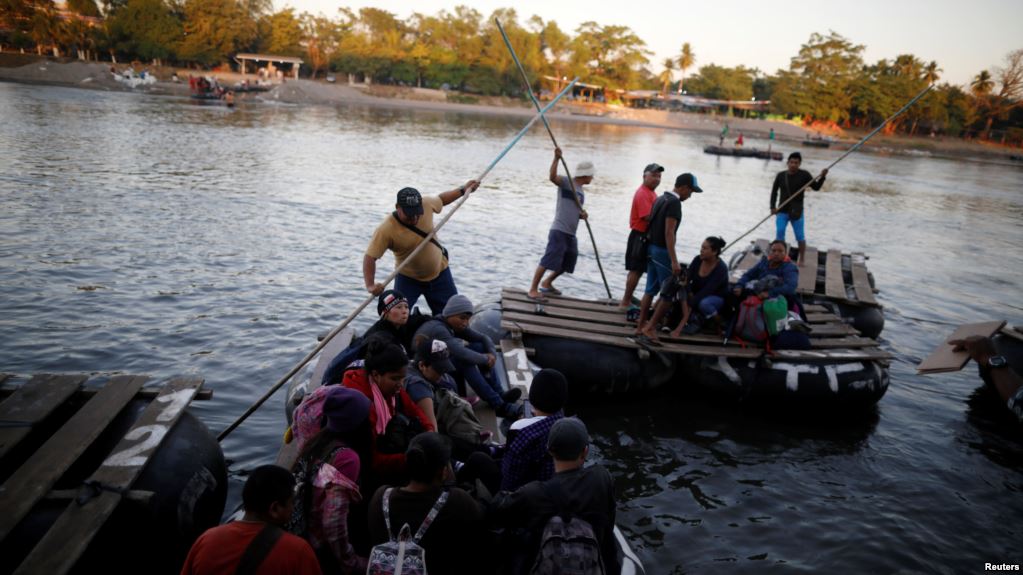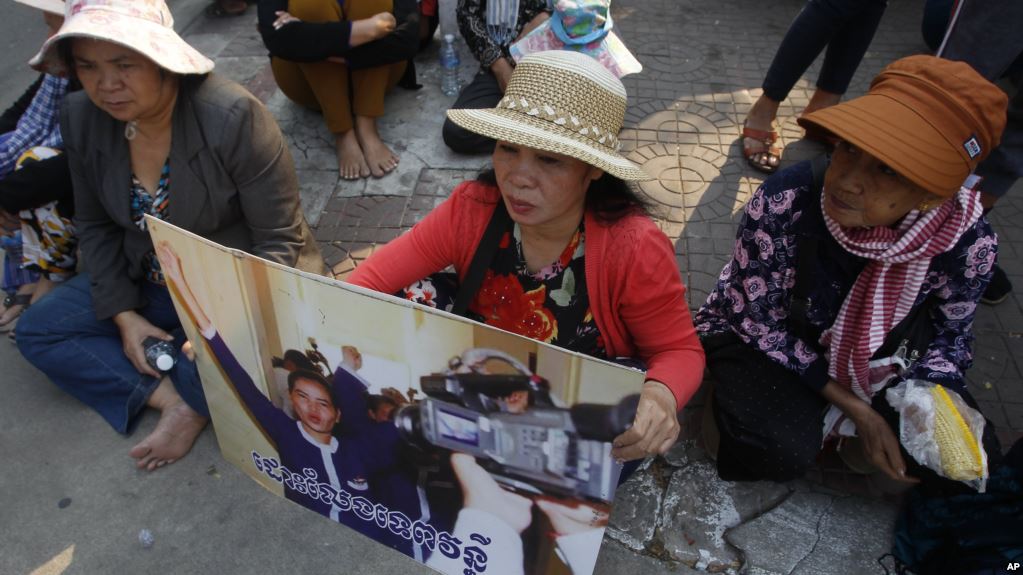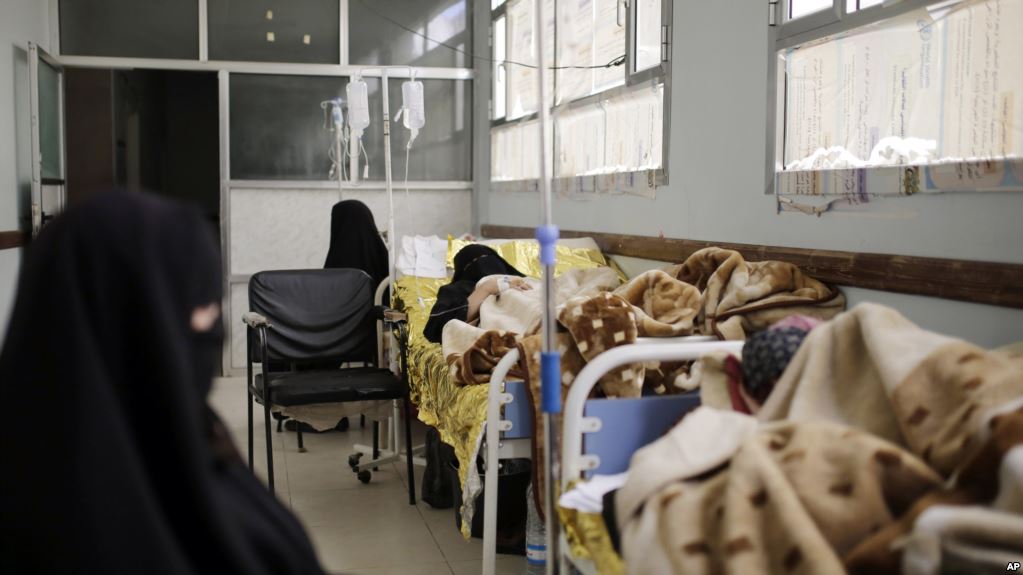뉴스&스피킹(영자신문)
하루 10분이면 영어에 대한 두려움을 극복하고 누구나 유창하게 영어를 구사하실 수 있습니다.
-
 US Aid Cuts to Central America May Backfire, Increase Migration North Aid groups have criticized the United States for its decision to cut assistance to three Central American nations. They warned this week that the decision is likely to backfire.
US Aid Cuts to Central America May Backfire, Increase Migration North Aid groups have criticized the United States for its decision to cut assistance to three Central American nations. They warned this week that the decision is likely to backfire.
The charities added that they believe it will increase the numbers of Central Americans moving north toward the U.S. border to escape violence and poverty.
The U.S. State Department announced last weekend it would end foreign aid to programs in El Salvador, Guatemala and Honduras -- three countries known as the Northern Triangle.
President Donald Trump has said repeatedly that he planned to suspend the aid. He criticized the three for doing little to stop the movement of migrants and asylum seekers, many of whom want to live in the United States.
Charities receive money from the U.S. government to assist with economic and social development in El Salvador, Guatemala and Honduras. The groups say aid cuts will not stop the migrants and may make the situation worse.
"The people who are really going to get hurt by this are the people who are … small farmers and teenagers trying to avoid the pressures of joining gangs and escape violence," said David Ray. He is with the international aid group CARE.
"Poverty, violence and insecurity - those are exactly the drivers of migration. (It) seems to be self-defeating," he told the Thomson Reuters Foundation.
The United States provides hundreds of millions of dollars every year for aid projects in the Northern Triangle. U.S. aid to Central America dropped to $527.6 million this year from $655 million in 2017. Those numbers come from the Washington Office on Latin America, a research group.
Trump's idea to reduce aid to the Northern Triangle could add to migration north as the situation in their countries worsens, experts said.
"He is concerned about border security," said Robert Zachritz. He is vice president for advocacy and government relations at the charity World Vision. "(This move) is counterproductive," he added.
World Vision usually receives about $127 million in U.S. government money for Northern Triangle projects.
CARE would have to greatly reduce efforts in the area, including a project that helps poor farmers in Guatemala.
Battle Ahead
Reducing aid is likely to meet strong opposition in the U.S. Congress.
To make changes, lawmakers must approve Trump's plan to change spending bills already passed. To get congressional approval, the Trump administration must make an official request explaining its plan for removing the aid money from the budget.
"It is Congress that decides on how much foreign assistance the U.S. is going to provide," said Adriana Beltran. She is head of WOLA's Citizen Security Program and a Central America expert.
She added that because Congress controls all the money, there will be a fight between it and the Trump Administration.
Rick Jones works as an advisor for Catholic Relief Services. Last year, the group planned projects in the Northern Triangle with the help of $34.4 million in U.S. government money. It also said a reduction of aid will increase migration.
It “is morally wrong and is counterproductive," Jones said.
One of its endangered projects provides training and jobs to more than 5,000 young people in poor, violent communities in Honduras and El Salvador, he said.
Vicki Gass is a senior policy advisor at Oxfam, a British aid organization that does not receive U.S. money. She said a reduction in aid will create “greater instability” that will lead to more migration. She said that if aid groups don’t work to stop the causes of problems such as violence and poverty, they will just get worse and lead to even greater numbers of migrants.
I’m Susan Shand.View -
 Study Finds One in Four Worry about Losing Home, Property Property rights are not only about ownership of land. They provide reasons for people to invest in and develop their homes and communities.
Study Finds One in Four Worry about Losing Home, Property Property rights are not only about ownership of land. They provide reasons for people to invest in and develop their homes and communities.
That is what Malcolm Childress says about the importance of studying people’s opinions about property rights. Childress is co-director of the Prindex research group.
“You know when people have security and feel secure about their property rights, they’re more likely to want to invest in their homes to make long term investments in businesses to do the kind of things in agriculture that lead to long term crops and investment in soil conservation.”
A new study by Prindex found that one in four people questioned in 33 countries fear losing their homes or land. Most of the countries surveyed are in Africa. The others included Britain, Cambodia, Colombia, Indonesia, Mexico, Peru and Vietnam.
One surprising finding, however, was that the East African nation of Rwanda had the lowest property insecurity in the countries studied. Only eight percent of those asked feared losing their homes or property in the coming years.
Childress said that Rwanda has, in recent years, put in place a policy to document each property and to identify who has rights to that land. He added that Rwandan officials have created a system which provides legal protections to land holders.
These are the kinds of policies that will lead to progress on the issue of land rights, he said.
Three other African countries had the highest levels of what the survey calls “tenureinsecurity,” a person’s fear of losing their home or land. The three were Mali, Liberia and Jordan. Mali had the highest. Forty-four percent of those asked feared they would lose their homes or land.
Insecurity was highest in West and Central Africa and lowest in Latin American countries, the study found.
Childress said that the differences between countries were not as surprising as the differences between men and women within countries.
In the study, women were more likely than men to have fears of losing their homes or land. Women were about 12 percent more likely to be concerned about losing their home or land if they split with their husband or the husband dies.
Childress says elected officials need to direct more attention to making laws fair for men and women. He added that people’s concerns can also be affected by how well laws are carried out in the real world.
The report noted that countries with laws guaranteeing equal treatment of the sexes may still have imbalances in citizens’ concerns about property rights. The study did not find a strong relationship between “tenure insecurity” and legal issues like inheritance rights in many places.
Property rights and easing poverty
Anna Locke is the other Co-director of Prindex. She wrote in the company’s blog that property rights are listed under poverty reduction as one of the United Nations’ Sustainable Development Goals. She said the U.N. calls for increasing the number of adults with “legally documented property rights” and also the number of adults who believe their rights are secure.
Prindex’s studies, she said, are one way to better understand what people around the word believe about their property.
Property rights are included with the goal on reducing poverty because people’s expectations of the future are important to forming their behavior today. For example, farmers afraid of losing their land are unlikely to plant crops for the next harvest.
Prindex expects to expand its studies of people’s opinions about their property rights and protections. Childress told VOA that the research group plans to release information on 107 additional countries by the end of the year.
He also says he wants the research to center more narrowly on individual cities and places where policies could target geographical areas or groups.
Prindex recently released the findings from its latest study at an event in Washington.
The study was carried out with support from the Global Alliance for Land and the Overseas Development Institute. Both research groups are based in Britain.
I’m Mario Ritter Jr.View -
 Arrest at Trump’s Florida Property Raises Security Concerns Palm trees moved slowly as a light ocean breeze passed through Palm Beach, Florida last Saturday. That was the day a woman entered the grounds of U.S. President Donald Trump’s Mar-a-Lago resort. Trump has called the property his “winter White House.”
Arrest at Trump’s Florida Property Raises Security Concerns Palm trees moved slowly as a light ocean breeze passed through Palm Beach, Florida last Saturday. That was the day a woman entered the grounds of U.S. President Donald Trump’s Mar-a-Lago resort. Trump has called the property his “winter White House.”
The woman told security officials she was going to the resort’s swimming pool. She showed them two Chinese passports with the name Yujing Zhang.
The security officials did not know if she actually had permission to enter, so they called the front desk at Mar-a-Lago.
The property is on an island between the Atlantic Ocean and a small waterway called Lake Worth Lagoon. The land was developed in the 1920s and bought by Donald Trump in 1985. Today it is part house, hotel and restaurant. It has a spa, a s wimming pool, workout machines and tennis courts. There is a nearby golf club also called Mar-a-Lago – or “Sea to Lake,” in Spanish.
Trump goes to Mar-a-Lago every few weekends to enjoy the warm weather, rest and do government business. Hundreds of people who have paid to be members of Mar-a-Lago are also permitted to visit the area. However, they must be checked and questioned by security.
On this day, March 30, security officials noted that the name Yujing Zhang sounded similar to a club member. They gave her permission to enter the grounds.
When the woman came inside, she spoke to workers at the front desk. She said she was there a little early for a “United Nations Friendship Event.” But the event did not really exist.
Later, she said a friend had told her to come to Mar-a-Lago. She claimed she wanted to talk to someone in the Trump family about Chinese and American economic relations.
Workers and security officials quickly grew suspicious. Officials searched her belongings and found four cell phones, a laptop computer, and an external hard drive. They also found a small device containing a computer virus – but nothing for her to wear while swimming in the pool.
Zhang was charged with making false statements to government officials and illegally entering a restricted area. She has been detained until a court hearing later this month.
Officials are also looking into whether Zhang was part of a larger effort to reach Trump and try to do harm. They are treating the case as a possible threat.
The event raises concerns again about the difficulty of keeping Mar-a-Lago secure.
David Kris is an expert on foreign intelligence at Culper Partners, a consulting business in Seattle, Washington. He says Mar-a-Lago is not well-defended and is at risk of both physical and cyber attacks.
A top official at the security company CTC International Group described guarding Mar-a-Lago as a “nightmare.” The number of people who can come and go make protecting Trump and the property much more difficult.
The U.S. government spends more than $3 million on security at Mar-a-Lago every time Trump visits there. The agency responsible for guarding the president is the Secret Service. The agency said in a statement that its work at Mar-a-Lago is the same as at other places the president visits for a short time.
Trump himself also dismissed security concerns after the arrest. “We have very good control,” he told reporters.
I’m Kelly Jean KellyView -
 Killed by Cholera, Yemeni Doctor Knew He was Fighting 'Disastrous' Epidemic Yemeni doctor Mohammed Abdul-Mughni described the rising number of cholera cases he was treating as “disastrous.”
Killed by Cholera, Yemeni Doctor Knew He was Fighting 'Disastrous' Epidemic Yemeni doctor Mohammed Abdul-Mughni described the rising number of cholera cases he was treating as “disastrous.”
Two weeks later, he also died of the disease.
Yemen has been at war since 2015. The conflict has led to food shortages and put 10 million people at risk of famine.
Then cholera struck.
The United Nations says it has recorded 110,000 probable cholera cases and 200 deaths in three months. UN officials say the disease is spreading like “wild-fire.”
Cholera usually spreads in unclean water and contaminated food. One sign of infection is severe diarrhea.
Abdul-Mughni had been working in a diarrhea treatment center at a hospital in Sanaa. About 120 to 150 severe cases arrive there every day.
“We are taking in patients around the clock, constantly...Cholera is spreading widely now,” said Ismail Mansoury. He is a doctor who worked with Abdul-Mughni. Mansoury told the Reuters news agency he had seen about 1,100 cholera patients in the past two weeks.
Cholera causes severe diarrhea and fluid loss. It can kill within hours. Children, older adults and those who are weak from hunger are most at risk.
The diarrhea treatment center has temporary shelters, outdoor restrooms and overworked employees. Women receiving intravenous fluids take up every place out of the sunshine. Children lie on the ground. A man helps a boy to use a restroom.
Many of those arriving are in shock or suffer from kidney failure. They are so dehydrated it is difficult to give them lifesaving fluids.
As the Iran-backed Houthis fight the Saudi-backed Yemeni government, the country has collapsed. The war has destroyed Yemen’s healthcare system and the economy. People must travel great distances to find simple medical care.
“Hardly a drop of water”
The 70-year-old mother of Mona Ali’s husband traveled 25 kilometers to the hospital in a bus after three days of uncontrollable diarrhea and being sick.
Ali had cholera two months ago and recovered at home. She told Reuters her family was poor and had to borrow money to bring her mother-in-law to the hospital.
“If there was food the body would be stronger,” she said.
Water is not easily found in Yemen, the poorest nation on the Arabian Peninsula. Pumps are needed in many parts of the country to bring water up from the ground. Clean water has become costly because of rising fuel prices.
Ali said her village cannot pay for the fuel needed to pump the water. “We end up taking it from the wells, even though…it harms us,” she said.
The cholera outbreak is also a sign of the war’s destruction of public health systems. Human waste has polluted so much water that it is ending up in the water used for farming, explained Tarik Jasarevic. He is a spokesman for the UN’s World Health Organization.
To slow the disease’s spread, diggers have been removing waste from the streets of Sanaa and spraying areas with disinfectant.
Yemen’s war began in late 2014 when Houthi forces pushed the government of President Abdul-Rabbu Mansour Hadi out of Sanaa. A Saudi-backed alliance of Yemeni and Arab forces began fighting in March 2015 to re-establish him as president.
The Houthis say their revolution is against corruption. They control Sanaa and most population centers.
The war has slowed the movement of aid, fuel and food. It has reduced imports and caused severe inflation. Those with government jobs have not been paid in months and are urgently looking for food.
Mohammad Habab is a 34-year-old university-educated father of three. He works for a state-operated company, but has not been paid.
His three-year-old daughter Zainab was receiving fluids nearly 80 kilometers from home after developing signs of cholera. Habab blames her condition on a lack of clean water and food.
I’m Susan Shand.View -
 Alaska Natives Honored for Secret Communications Work American Richard Bean, Sr., died with a secret. He was a war hero, but nobody knew about it for years.
Alaska Natives Honored for Secret Communications Work American Richard Bean, Sr., died with a secret. He was a war hero, but nobody knew about it for years.
Bean and four other Alaska Natives were recently honored in their home state for saving the lives of many soldiers during World War II.
As young men, Bean and the others served in the United States military. During the war, they made good use of their mother tongue, the Tlingit language. As children, they could not speak Tlingit at schools in their southeast Alaska villages. But in the U.S. military, their officers asked them to use their native language to help the military. When they spoke in a code that used Tlingit, the Japanese could not understand them. They did the same thing as other, more famous American soldiers: the Navajo Code Talkers.
Rosita Worl is president of the Sealaska Heritage Institute, a nonprofit group set up to protect and strengthen the cultures of Alaska's Tlingit, Haida and Tsimshian tribes.
Worl told the Associated Press that, when the Tlingit soldiers were children, teachers and religious workers suppressed their language. Punishments for students who spoke their language included having their mouths washed out with soap and their hands struck by sticks, she said.
Until recent years, however, most people did not know what the Alaska Natives had done. The U.S. military for a time kept the unbroken codes secret in case they were needed in future wars.
"Their orders were not to talk about it," said Ozzie Sheakley, a Tlingit leader who once served in the U.S. Army. "They took those orders seriously."
Their families had no idea that the five men were heroes. All of them were from small towns on Alaska's Panhandle: soldiers Richard Bean, Sr. of Hoonah, and Robert "Jeff" David, Sr. of Haines; Sitka brothers and Navy men Mark Jacobs, Jr. and Harvey Jacobs; and George Lewis Jr., who was also from Sitka and is believed to have served in the Army.
Ron Williams never knew either, even though he and Richard Bean were extremely close. Bean was his uncle.
Williams said there was only one small piece of evidence. His uncle told him a platoon commander heard him speaking Tlingit with fellow Code Talker Jeff David while the two were fighting in the Philippines together. The commander asked if the men would like to work on communications, then gave each a small radio. But that was the end of Bean's story, and Williams never asked for more, because it seemed his uncle did not want to talk about it. Richard Bean died in 1985.
"Even the guys that knew him all his life, you know, they didn't know what he did either because he never said anything about it," Williams said.
David never said anything about it to his son, Jeff David, Jr., either.
"He just said he was in special services, and that was as far as he put it," the son said. "And he was stationed in the Philippines for a while."
The military released information about the Navajo Code Talker program in 1968. But it would be many more years before the U.S. government recognized the work of Tlingit servicemen.
In 2013, Congress recognized the Code Talkers from 33 tribes, including the Tlingit men, who were awarded silver medals after their deaths.
Thinking of the national honors, former Alaska state representative and Tlingit military veteran Bill Thomas decided it was time for state recognition. Alaska lawmakers agreed when Thomas pushed for the idea along with the help of the Sealaska Heritage Institute. In March, legislators passed an official order honoring the Tlingit Code Talkers.
Learning about the important part these men played in history was a big surprise for the family of George Lewis Jr.
His son, Ray Lewis, was born after the war and never even knew his father was in the military. There are no military records in the family to even tell what part of the military his father served in, he said.
It was a great honor to learn his father was part of such important work.
“I’m very proud of it,” Ray Lewis said. “My father was instrumental in saving a lot of lives out there.”
I’m Jill Robbins.View

